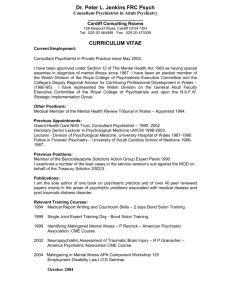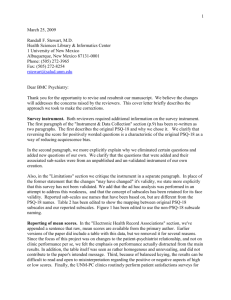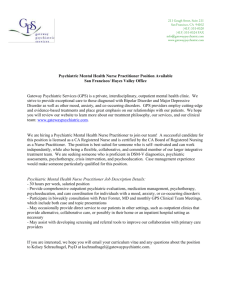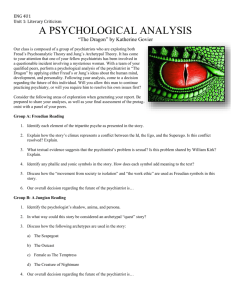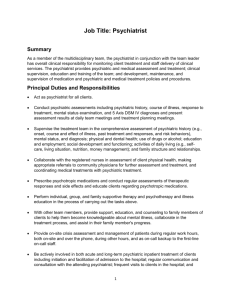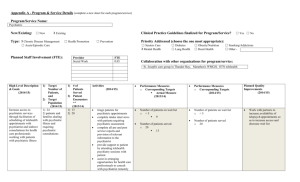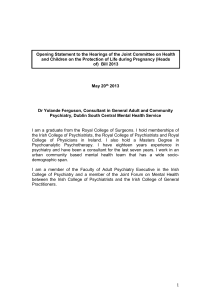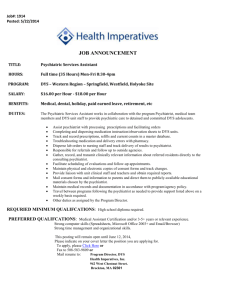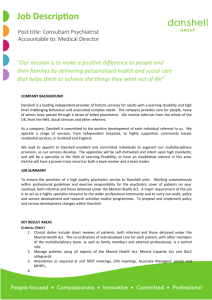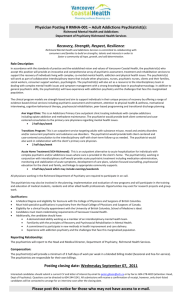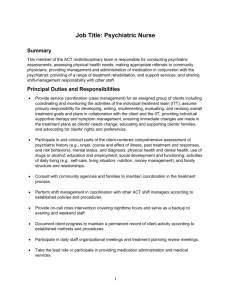House Bill 216 Health and Aging Committee Proponent
advertisement
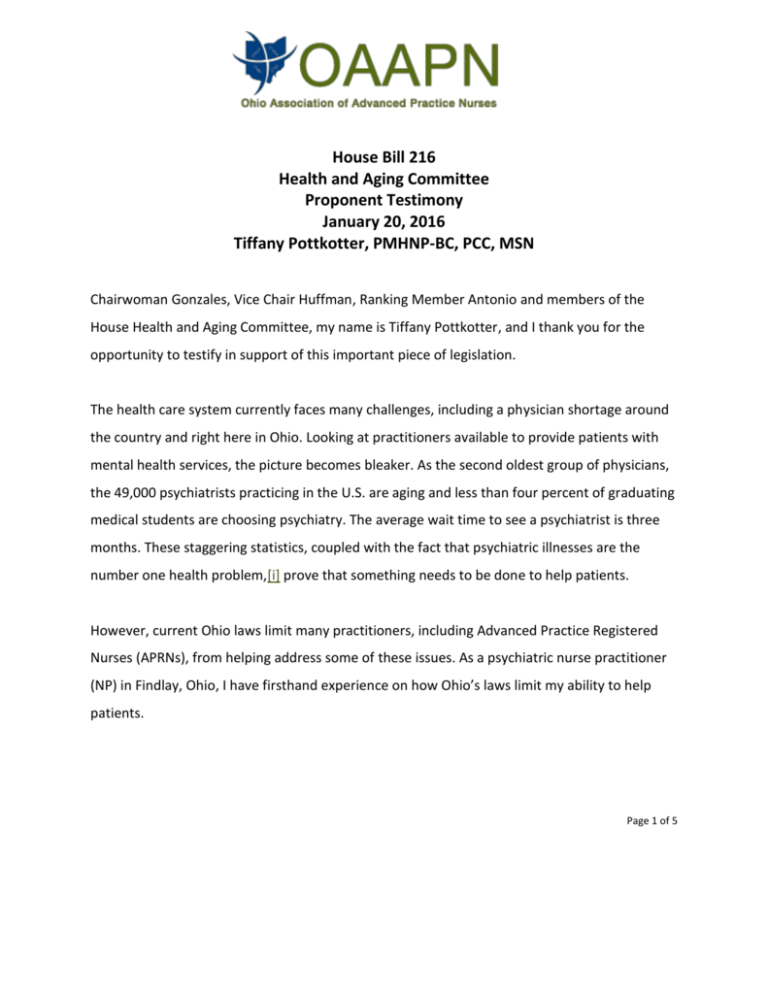
House Bill 216 Health and Aging Committee Proponent Testimony January 20, 2016 Tiffany Pottkotter, PMHNP-BC, PCC, MSN Chairwoman Gonzales, Vice Chair Huffman, Ranking Member Antonio and members of the House Health and Aging Committee, my name is Tiffany Pottkotter, and I thank you for the opportunity to testify in support of this important piece of legislation. The health care system currently faces many challenges, including a physician shortage around the country and right here in Ohio. Looking at practitioners available to provide patients with mental health services, the picture becomes bleaker. As the second oldest group of physicians, the 49,000 psychiatrists practicing in the U.S. are aging and less than four percent of graduating medical students are choosing psychiatry. The average wait time to see a psychiatrist is three months. These staggering statistics, coupled with the fact that psychiatric illnesses are the number one health problem,[i] prove that something needs to be done to help patients. However, current Ohio laws limit many practitioners, including Advanced Practice Registered Nurses (APRNs), from helping address some of these issues. As a psychiatric nurse practitioner (NP) in Findlay, Ohio, I have firsthand experience on how Ohio’s laws limit my ability to help patients. Page 1 of 5 Under current Ohio law, I cannot practice without a collaborating physician. This means I need a legal, written agreement with a physician, and without one, I cannot practice. I am one of only two psychiatric NPs in all of Findlay. Additionally, I am the only NP certified to treat the mental health needs of children and adolescents. There are psychiatrists in the area who can treat children 14 years and older, but I am qualified to see children as young as four years old. I have been approached to provide mental health care to patients in university settings, nursing homes, prisons and schools for those with developmental disabilities because these institutions had no immediate access to a psychiatrist. Unfortunately, I had to turn these down because I did not have a psychiatrist to enter into a collaborative agreement with. Additionally, I have had patients transferred to me who just moved to the area and have been stable, yet sometimes I am unable to maintain their current prescribed medications because they are not on my formulary. The reality is collaborators can leave or choose to terminate the agreement at any time, meaning not only is the nurse practitioner out of a job, but all of the patients who were under their care are now immediately without a provider. I lost my collaborator when the psychiatrist in my practice switched jobs. I then had three psychiatrists as collaborators in an office an hour away, and within the last year, two of the three left (one of them is a child psychiatrist), leaving me with one collaborator. However, if that collaborating agreement were to end, it would be a struggle to find another collaborating psychiatrist, which would leave more than 500 patients without mental health services. The Page 2 of 5 closest psychiatric health care option would be in Toledo or Columbus, a significant drive for my patients, especially parents who would most likely need to miss work and pull their child out of school to seek care. A psychiatric nurse practitioner in Columbus lost her collaborator suddenly and unexpectedly when he backed out of a collaborative agreement. He told her that his lawyer did not recommend a collaborative relationship due to liability insurance not covering this. She was starting to build a practice with mental health patients and prescribe medications, and now had to tell them she could no longer be their mental health care provider. She had to stop medications abruptly, which causes serious medical concerns. She called more than 10 psychiatrists to be collaborators; none of them felt comfortable taking on this role. In the midst of trying to ethically decide what to do with her patients, she received a visit from the Board of Nursing for an audit. In her words, “How am I supposed to be responsible for my patients when my collaborator can just leave, deny collaboration, or take absolutely no responsibility for the patients that I have taken on?” Additionally, the mental health population is underserved in rural areas. I have patients drive from more than 15 counties because there are no mental health professionals where they live. Psychiatric nurse practitioners are needed in these rural areas to provide greater access to these patients, however, there is no collaborator. A lot of these patients face socioeconomic issues, which impede their ability to drive an hour away for an appointment. Page 3 of 5 Collaborating physicians are so scarce that some NPs I know are paying up to $1,000 per month out of their pocket. It scares me to think of what could happen for patients if we continue down the current path. One in four adults are affected by a mental health disorder, yet two-thirds don’t seek help from a health care practitioner.[ii] One in five children ages 13-18 have or will have a serious mental illness, and the average delay from when symptoms appear to seeking care is 8-10 years.[iii] I see patients of all backgrounds and diagnoses such as ADHD, Autism Spectrum Disorder, PTSD, victims of physical and sexual abuse, homeless individuals, recovering drug addicts, college students, suicidal and homicidal teens and adults, people with depression, anxiety, bipolar disorder, eating disorders, schizophrenia, psychosis, grief and developmental disabilities. House Bill 216 is a solution! The bill would allow APRNs to practice to the full extent of their education, training and certification without a legally mandated collaboration agreement with a physician. We would continue to professionally collaborate with our medical colleagues and could serve our patients with fewer barriers to care. We are liable for our own actions. It would not increase risk to patients, but would ensure NPs like myself could continue to practice without having to worry about what would happen if our collaborating agreement was in jeopardy. [i] Journal News. “Ohio has ‘critical’ shortage of psychiatric hospital beds. March 1, 2015.http://www.journalnews.com/news/news/ohio-has-critical-shortage-of-psychiatric-hospital/nkKLW Page 4 of 5 [ii] World Health Organization. Mental health disorders affect one in four people.http://www.who.int/whr/2001/media_centre/press_release/en/ [iii] National Alliance on Mental Illness. Mental Health Facts: Children & Teens.https://www.nami.org/getattachment/Learn-More/Mental-Health-by-the-Numbers/childrenmhfacts.pdf Page 5 of 5

